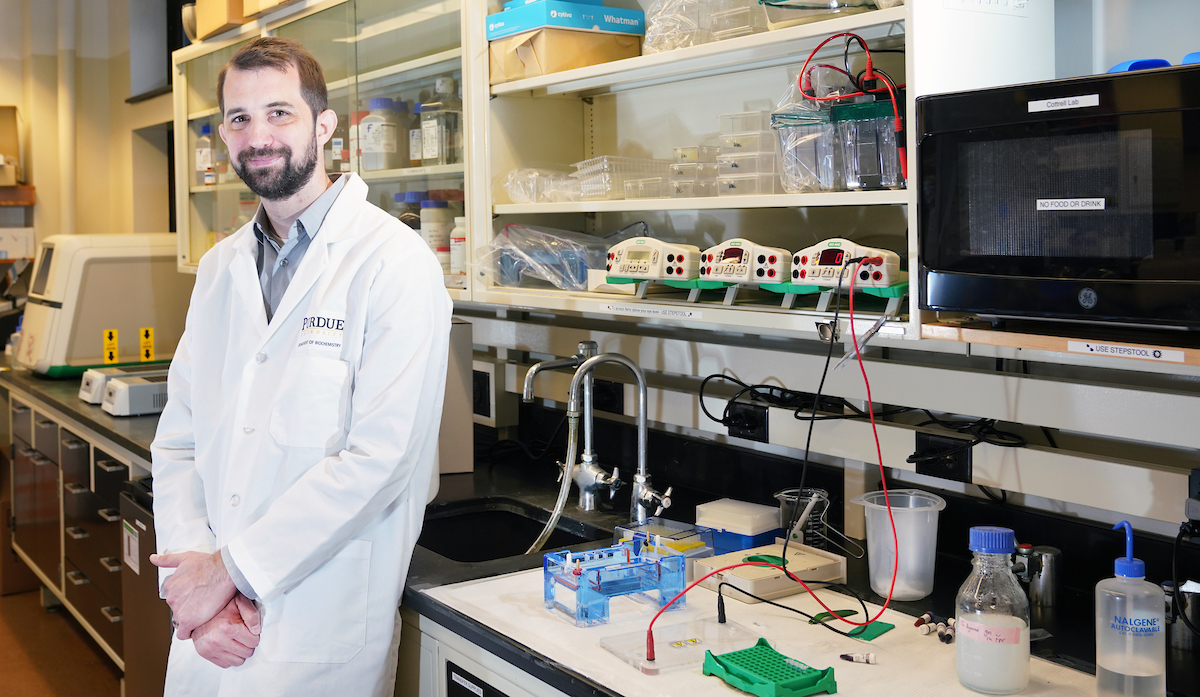Kyle Cottrell’s path to NIH early career award began at community college
Kyle Cottrell, assistant professor of biochemistry at Purdue University, has received an MOSAIC R00 award from the National Institutes of Health.
The goal of the NIH MOSAIC (Maximizing Opportunities for Scientific and Academic Independent Careers Scholars) K99/R00 program is to help outstanding postdoctoral researchers from diverse backgrounds to transition from mentored positions to independent, tenure-track or equivalent faculty appointments.
Cottrell is one of three new faculty members who joined the College of Agriculture this spring. And he is one of Purdue’s 46 early career award recipients from federal agencies thus far in 2022-23.
A first-generation college student who began his undergraduate studies at Ozark Technical Community College in Springfield, Mo., Cottrell had to overcome multiple hurdles, financial and otherwise.
“If you’re a first-gen, it’s not straightforward to understand all the unwritten rules in academia,” he said. Unlike many of his peers who have parents who are faculty members, “I had to lean more on my mentors as I was going through this process.”
Cottrell specializes in ribonucleic acid (RNA) editing, post-transcriptional regulation and cancer. He became interested in RNA, a biomolecule that plays key roles in cellular and viral processes, as an undergraduate. Post-transcription applies to processes taking place after RNA has copied a gene sequence. His current research involves identifying the relationship between the RNA-editing enzyme ADAR (Adenosine deamiase acting on RNA) and triple-negative breast cancer, the deadliest form of the disease.
Cottrell received the MOSAIC K99 award in 2021. The K99 phase supported one year of his postdoctoral training, while the new MOASIC R00 phase supports the first three years of his independent research career.
The NIH assigns MOSAIC Scholars to an academic or professional society for assistance in career development and making the transition to a faculty position. Cottrell was assigned to the American Association of Medical Colleges.
 Kyle Cottrell, assistant professor of biochemistry at Purdue University, is a National Institutes of Health MOSAIC Scholar.
Kyle Cottrell, assistant professor of biochemistry at Purdue University, is a National Institutes of Health MOSAIC Scholar. As a MOSAIC Scholar, he joins a cohort of other MOSAIC awardees for special training, networking and other activities. The program also provides external mentors for its awardees to help guide their career development and starting their labs. Cottrell’s mentor during the R00 phase is Brenda Bass, Distinguished Professor of Biochemistry at the University of Utah’s School of Medicine and a member of the National Academy of Sciences.
A graduate of Missouri State University, Cottrell received his bachelor’s and master’s degrees in cell and molecular biology. As a volunteer undergraduate researcher at Missouri State, he joined a team that used a system based on RNAi (RNA interference) to regulate gene expression.
“It’s an RNA-centric approach to reducing the expression of a gene. That was my first taste of RNA biology, and that particular method made me more interested in it moving forward,” Cottrell said.
He received his Ph.D. in molecular cell biology from Washington University in St. Louis. As a postdoctoral research associate from 2018 to 2022, he conducted research in the laboratory of Jason Weber in Washington University’s department of medicine. During this period, he received the
Ruth L. Kirchstein National Research Service Award for a postdoctoral fellowship, and an American Association for Cancer Research-Bristol Myers Squibb Cancer Disparities Research Fellowship.
At Washington University, Cottrell founded and served as president of First-Gen Scholars, a group for graduate students and postdoctoral researchers who were first-generation undergraduates. He has mentored high school, undergraduate and graduate students, and currently mentors two Purdue undergraduates.





